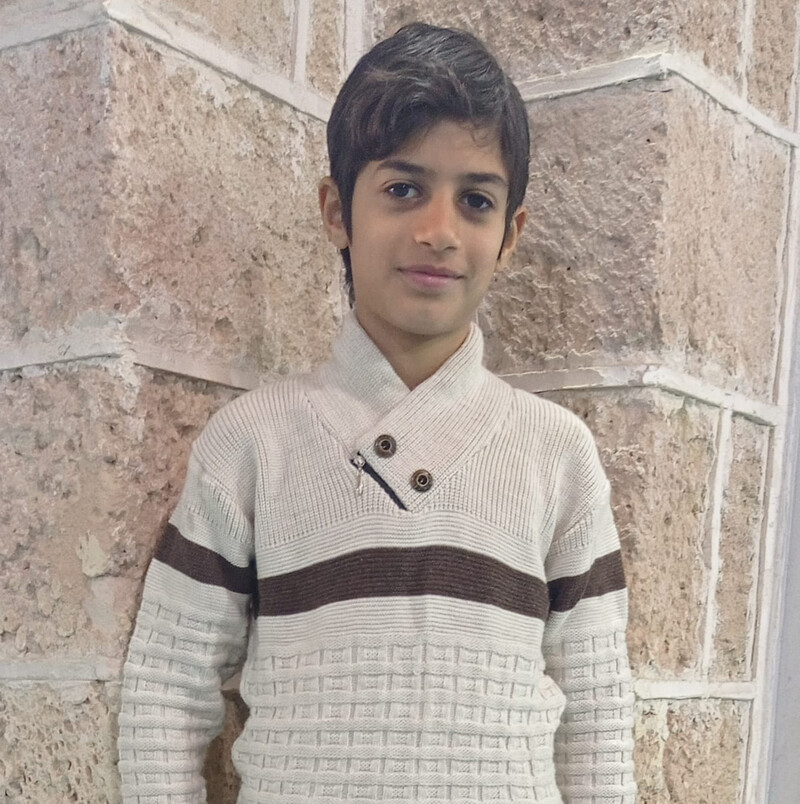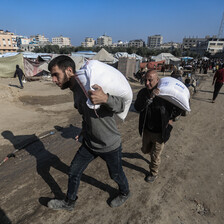The Electronic Intifada 3 November 2023

“Abboud was my companion. And I his.” (Courtesy of the family)
I write these words from my hospital bed. I am beginning to have some energy to hold my phone and use my fingers after 10 days here.
I write in grief.
I woke up in my family house in Rafah, in the south of Gaza on Tuesday morning, 24 October.
The house is – was – made up of three levels.
My father, his wife, my married siblings and their children all live there. My children come to visit their grandfather’s house to play with their cousins.
I was sitting with my children, and they began what has become a regular conversation in a time of genocide.
How do we find bread and water for the day? And where can we find a solar power panel to charge our phones? We sometimes managed to charge our phones in the school next door.
We were sitting in the living room, and I was talking to my eldest son Abdullah, 13. He had just come back from the corner shop and had bought some biscuits.
Abdullah – I called him Abboud – loved to share what he bought with his allowance.
I told him: “Whatever you want habibi, next time I will buy it.”
Abboud had bought biscuits instead of bread. There was no bread.
There is no electricity or fuel. Israel has cut off all food, fuel and electricity supplies to Gaza. We had to find substitutes, and we told our children to buy biscuits to sate their hunger for bread.
Abboud, my other son Hammoud and my daughter Batool were sitting with me. Abdulrahman, my fourth child, was at that moment out of the house.
Abboud said he was going to get my phone, which was charging in the school at that point. He and his cousin had agreed among themselves to take turns to go. It was his turn.
It was the last conversation I had with him.
Aftermath
I didn’t hear a sound. I do not remember what happened.
I must have been unconscious, but I don’t remember for how long. Maybe it was just five minutes.
When I opened my eyes, I felt a dizziness that I cannot properly describe. There was dust and rubble everywhere.
I knew the house had been bombed but I couldn’t hear anything. My hearing was gone.
I looked next to me, and saw Hammoud and Batool sticking to me, screaming, and pointing to Abboud. I looked, and Abboud was lying in front of me.
I looked the other way, and I saw the body of a woman and then the body of another woman.
Both my aunts, one of their daughters and my stepmom were nearby.
My elderly aunt was staying with us. Her son and three grandkids had been martyred just the day before, and my father had brought her to stay with us so we could care for her.
My other aunt had also decided to come that day so she could console her sister. The rest of the family was all on the eastern side of the house.
It was clear that the missile had struck the part of the house that me and my children were sitting in.
I looked around and saw my father trying to hold on to the children.
I saw that the house was destroyed. I saw we were in the rubble.
I saw that people had gathered. I began yelling to them despite not being able to hear my own voice: “Come fast, there are children and women lying on the floor…”
They took me to a hospital. My neighbor took me there on foot.
He felt my injury was relatively minor in comparison to others and anyway, emergency responders were working under extreme pressure. As I was walking, I kept telling people to save the children.
The image of Abboud would not leave my mind.
I received first aid at the clinic. Then I was put in an ambulance and moved to the Rafah hospital.
From there I went to al-Nasser hospital in Khan Younis.
My brother was with me. He told me the news as he got it: Both my aunts had been killed. So had my aunt’s daughter and my stepmom.
Hammoud and Batool and my three sisters were all injured, and I learned a week later that our neighbor was martyred too as he was hit with shrapnel. Abboud and my niece Joud, 10, were both in critical condition.
After a day in intensive care, Abboud died. Joud followed the next day.
My injuries, and those of my other children, were classified as second degree burns. People kept coming to tell me that I was lucky and that I would recover.
Alhamdulillah.
My companion
But my mind was filled with Abboud, my sweet son, who was closer to me than anyone and I to him.
I know how much innocence, love, kindness and generosity his heart holds, and how his soul flows with curiosity for adventures and discovery and innovation. Many times, he would come to me excited by something he had invented, and explain to me how it worked.
His vibrant and intelligent questions would make me stop and wonder how, whatever it was, had never crossed my mind.
Abboud had so much potential that he is now unable to fulfil. He and I had a spiritual connection.
His eyes alone could tell me everything. And he could sense what I was feeling without us having to talk.
He was my companion. And I his.
In the last days before the crime, he had saved approximately $20 from his personal allowance. One day he brought them to me and said “baba, you take it because you need it now.”
“Thank you, habibi,” I told him. “I don’t need it, I have enough, thank God.”
He insisted.
I cannot write about Abboud in just a few hurried sentences. I need a long silence to understand what happened.
Why did Israel kill Abboud?
For the same reason it has killed thousands of other children and thousands of other innocent men and women.
Israel and its colonial government don’t see our humanity. They don’t see our passion and love.
They don’t even see our existence, because theirs is a doctrine of genocide and racial supremacy.
The attack on my home is an extremely illuminating example. They call it a war on Hamas, and are supported by colonial regimes the world over.
But where is Hamas in all these heinous crimes committed daily by Israel?
They killed four women and two children when bombing my home. These are Israel’s targets?
The vast majority of those killed by Israel to this point are women and children.
What killed my son Abboud wasn’t just an American missile fired by an Israeli pilot. What killed my son was a regime whose very existence is defined by and built on expulsion and genocide.
Unless this criminal regime falls, there will be thousands upon thousands who will have to grieve over these massacres.
This injustice will only end the moment this racist and colonial Israel falls.
As for you, my beloved Abboud: You will never leave my heart and soul, not for a second.
You will forever remain a source of inspiration to me. I draw love and strength from you.
Ahmed Abu Artema is a Palestinian writer, activist and refugee from Ramle.





